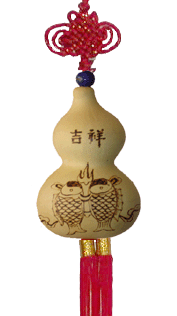Lanzhou gourd sculpting
China has a long history of sculpture art. The beauty of the sculptures is shown through its various textures. Stone sculptures and jade sculptures look cold and distant to us, whereas gourd sculptures are soft, tender, warm, and close to our hearts.
 |
Gourd sculpting is a well-known traditional craft. Craftsmen use needles to draw people, landscapes, flowers, and other patterns on specially bred gourds, accompanied by poems or calligraphy. The craftsmanship is delicate, exquisite and impressive. With its ethnic characteristics, it is favored by domestic and foreign appreciators.
 |
Origin
Lanzhou gourd sculpting originated out of practicality. Lanzhou City, as the most important spot on the Silk Road, attracted many merchants. Merchants from the Hu tribe held water in giant gourds that were sculpted with Chinese characters and patterns, and Chinese inland merchants transported the gourds to foreign countries. At that time, gourd sculpting techniques were rough. Medicine sellers hung huge gourds with the Chinese character “药(yao)” (medicine) in the doorway of their shops. During the Tang dynasty, the sculpting technique of gourds developed in a more exquisite way, turning the gourds into art pieces.
Gourd sculpting is a special art, not only because it has a long history in Lanzhou City, but also because people who learn sculpting have abundant artistic training. A master of sculpting should have exquisite sculpting techniques and knowledge of Chinese classical culture, poems, ancient books and records, calligraphy, and drawing. Therefore, the subjects for gourd sculpting are abundant: Tang poems, Songci Poetry, Buddhism, famous classic writings, various plantations, flowers, birds, fish, insects, natural sceneries, etc. The abundant knowledge of the sculptor makes his every piece unique, accurate and exquisite.
Today in Lanzhou City, there are many gourd sculptors. Even the gourds found among a vendor’s items is delicate.


















